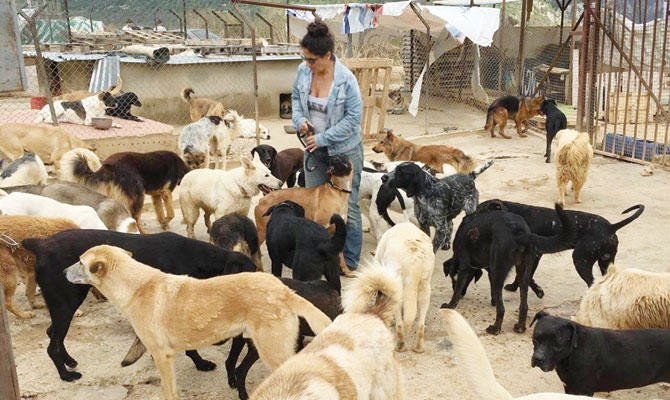BEIRUT: Video images showing the remains of stray dogs shot and buried on the state-funded Lebanese University’s Hadath campus in suburban Beirut have highlighted the growing problem of animals abandoned by their owners as the country’s economic crisis worsens.
Up to 50,000 stray dogs are estimated to be roaming the streets of Lebanon, according to welfare activists, with most unneutered and unvaccinated, posing a public health risk as the animals become increasingly aggressive and stocks of vaccines to combat rabies run low.
Images of five dogs found buried on the university campus sparked widespread anger this week after it was revealed the animals were being fed and cared for by students after having been abandoned.
Lebanese University’s 75 hectare campus is unfenced, and houses a large number of faculties as well accommodation for students, deans and visiting professors, and sports and health facilities.
Animal welfare activist Ghina Nahfawi told Arab News that the stray dogs were given names by students and would respond when offered food.
“We noticed one of the dogs became their leader and would tell the rest that it was OK to approach us,” she said.
“Last Friday, we could not find any trace of the dogs. Some were saying that the university administration and security guards wanted to get rid of them.”
Nahfawi said that students’ fears grew after another dog was found alive but in pain with symptoms suggesting it had been poisoned with Lannate, an insecticide that is highly toxic to livestock and wildlife.
“We saw blood and found some dogs that had been shot. We were told others were buried on the campus, but we did not believe it until we came across a foul smell and started digging with our hands, only to discover the bodies of five dogs.”
She said that students were told that other dogs, including pups, had been taken to mountainous areas and left to fend for themselves, and may have been killed by other animals.
Roger Akkawi, vice president of the animal charity Paw, told Arab News that up 50,000 pet dogs in Lebanon have been abandoned by their owners amid the pandemic and the devastating devaluation of the Lebanese pound.
“Most of the dogs left on the street are unneutered and unvaccinated. People think dogs are good hunters, but that’s not true — they depend on humans to survive,” he said.
“What people do not realize is the mating of two dogs may lead to the birth of an additional 400 dogs within two years, and that goes along with diseases resulting from the failure to vaccinate against rabies.”
Akkawi warned that Lebanon is “heading toward a catastrophe” because authorities have ignored the problem.
“People will encounter dogs on their doorsteps; many will die and no one will dare touch the bodies and bury them for fear of disease. Although the rabies vaccine is subsidized by the state, it is not available because suppliers do not care about importing it. The vaccine is only available in small quantities and for emergency cases.”
Amid the social media uproar over the killing of the stray dogs, students demanded an explanation from the university’s administration, calling for those responsible for the “massacre” to be held accountable.
In response, university authorities released a statement expressing regret for “the way in which the issue of stray dogs was addressed on and around the campus.”
The statement added: “A serious investigation has been opened. The administration had reached out to an animal welfare association and the Hadath municipality several times, but no radical solution was reached.”
The administration said that several students had been bitten by two dogs, adding that the strays are a threat to public safety in light of the lack of medicines and vaccines against rabies.
However, Nahfawi said that there is no evidence of students being attacked by dogs at the university. “The campus has been turned into a burial ground for dogs; that’s what really happened. They disregard all laws and accuse us of exaggerating the issue. This is shameful.”
She added: “The municipalities are responsible for addressing such issues, but they do not consider this a priority at the moment. Do they realize that unneutered and unvaccinated dogs pose a threat to people because we lack vaccines against rabies?”
According to Akkawi, the answer is to “trap, neuter and return dogs to nature.”
He said that the charity is training volunteers to handle stray dogs, but lacks funds to buy equipment and vaccines. “Municipal budgets do not take this matter into account, especially during the economic crisis we are experiencing.”
Akkawi said that the government does not consider the issue of stray animals a priority.
“We met the interior minister and warned that imposing lockdowns and keeping people at home during the pandemic would lead to massacres of stray dogs, which depend on restaurant waste to survive. We asked to be allowed out at night after curfew to feed dogs with the food we bought, but our request was rejected.”
Nahfawi said that while some may consider anger over the dog’s deaths as absurd compared with the suffering of people in Lebanon, “society will not become more peaceful and tolerant if it does not learn to properly deal with the most vulnerable beings.”
In August 2017, President Michel Aoun signed animal protection and welfare laws that include rules for treatment of stray dogs by municipalities.
In August 2018, the Ethical Treatment of Animals group won a ruling from the Lebanese judiciary jailing a man for 10 days and fining him $2,650 for mistreating dogs. The ruling was the first of its kind issued by a judicial authority in Lebanon, criminalizing the harming of animals.


























